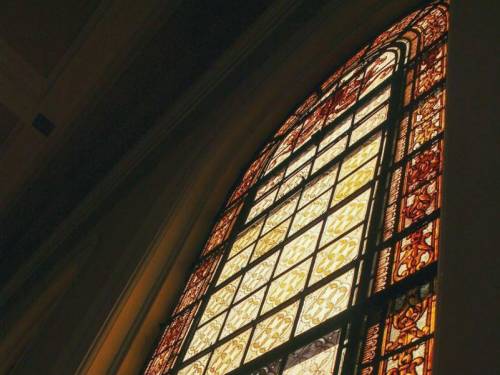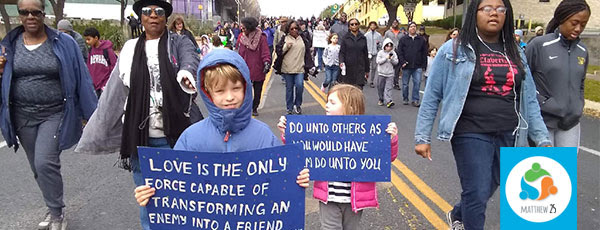What can one person do to combat climate change? Ask Mama Toya
April 30, 2020

Youth from Covenant Presbyterian Church in Madison, Wisconsin, join with local youth environmentalists organized by global partner Red Uniendo Manos Peru to support the work of Mama Toya. (Photo by Jed Hawkes Koball)
Last year, I took more than two dozen flights. In many cases I could have taken a bus, but for little extra cost, I opted to save time. A flight from Lima (on the Pacific coast) to Tarapoto (in the Amazon) takes a little over an hour. The bus takes more than 25 hours. So, for about $25 more per flight, it seems worth it to travel by air. I know my knees are grateful. But, like so many things in life, there are usually more costs than those that simply make a dent in our wallets. There are environmental costs, too.
Here in Peru those costs are adding up. Two years ago, unprecedented rains on the desert coast led to floods that displaced a quarter of a million people. This year, forest fires are decimating large swaths of the Amazon and threatening the lives of indigenous populations. Every year, farmers in the Andes are seeing their natural water supplies decrease. The water temperatures off the Pacific Coast are rising. The mountaintop glaciers are melting. The biodiversity of the rainforest is dying. This plus gross inequality and poor infrastructure make Peru one of the most vulnerable countries in the world to climate change.
In the grand scheme of things, air travel contributes to a relatively marginal 2% of all greenhouse gases. While not the most contributing factor to global warming, it is notable nonetheless. And, looking at my personal lifestyle, it is quite remarkable: The carbon dioxide emissions attributed to my air travel account for about 75% of my family’s carbon footprint. Despite all of our recycling, reusing, repurposing, limiting red meat consumption, not owning a car and not using air conditioning, our carbon footprint is still twice that of the average Peruvian family. I came here to help, not hurt.
Of the more than 24 flights I took in 2019, all except two were for my work. Some of those flights were to help our global partners prepare for Presbyterian short-term mission trips. We Presbyterians travel a lot! Those of us engaged in World Mission really travel a lot! And, let’s be honest: that’s not going to end anytime soon. And it will be decades before air travel can be supported by renewable energies. So, how can we hold ourselves responsible? How can we live into hope and not out of guilt or fear?
Just east of Lima, in the heart of the Andes mountains, 84-year-old Mama Toya — a friend to many Presbyterians — gets up at sunrise to tend to the trees on the hills outside her home. She has planted more than 30,000 trees over the past 20 years to help restore fertility to her community’s lands that have been contaminated by emissions from a nearby metals smelter as well as to adapt to advancing climate change.
Next year, our global partner, Red Uniendo Manos Peru, will donate $20 to its own newly established tree fund on behalf of each Presbyterian short-term mission trip participant it receives. Every penny of these funds will support Mama Toya’s work to help offset greenhouse gas emissions generated by short-term mission trip participants’ air travel.
What if this offset idea became our Presbyterian practice? What if we Presbyterians put money into a Presbyterian Tree Fund for every single flight taken for Presbyterian-related work? What if global partners around the world were supported in their reforestation efforts with these funds? Yes, there are many such funds one can contribute to. But how often can you see exactly where that money goes, while also igniting passion for the care of the very Earth that sustains the people we have come to love through partnership in mission? In the face of a climate crisis that impacts us all, may such love show us how to live justly in the world today.
Jed Hawkes Koball, Mission Co-Worker in Peru, Presbyterian Mission Agency
Let us join in prayer for:
PC(USA) Agencies’ Staff
Laura Caruthers, Presbyterian Foundation
Jennifer Cash, Presbyterian Mission Agency
Laura Caruthers, Presbyterian Foundation
Jennifer Cash, Presbyterian Mission Agency
Let us pray:
Lord, help me to listen for your voice, to hear what you are telling me to do and then to do it today. Amen.




















